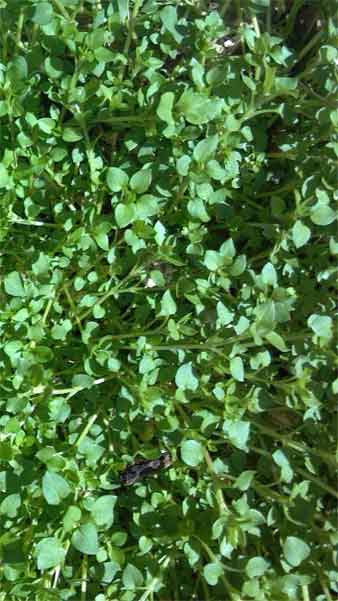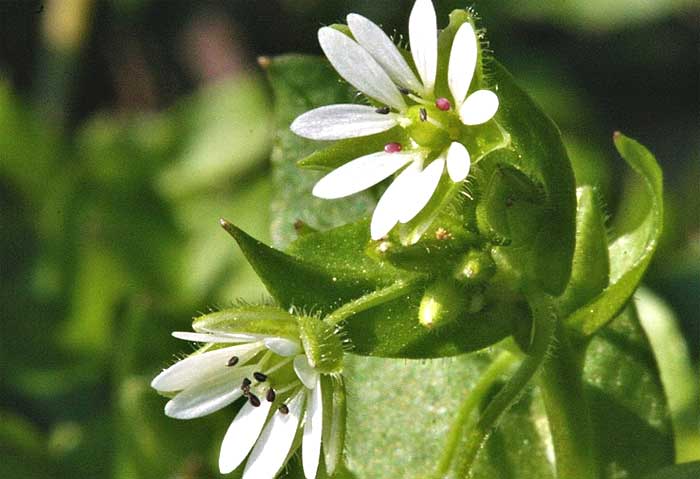Chickweed herb

Chickweed (stellaria media) is a small, spreading plant that helps heal eczema, other skin problems, stubborn boils, and abscesses.
Chickweed is also used to treat insect bites, stings, burns, rheumatic conditions, urinary infections, indigestion, constipation, obesity, and wounds. It does all this and more with no known side effects.
Read more about using natural remedies for beautiful skin.

Chickweed, also known as Star Lady and Mouse Ear, has leaves that are round and fleshy. Chickweed flowers are star-shaped.
The plant is easy to grow and one of the first herbs to emerge in spring. Use chickweed in skin ointments for external applications, or add to smoothies, stir fries, and herbal teas for taking internally.
Chickweed removes poisons from the body.
Fresh chickweed makes a cooling poultice for boils, skin problems like abscesses, splinters, and infected sores. As the poultice dries, it pulls out poisons and toxins.
Chickweed, whether fresh or dried, has astringent properties and is a good remedy for many skin conditions when added to creams and ointments. It also makes a good wash for wounds, irritated skin, rash, acne, eczema, bedsores, and painful joints.
Chickweed tea is a healthy tonic.
Chickweed may be taken in tea form when dried or added to green drinks when fresh. Chickweed is a great tonic for cleansing the lymphatic and urinary systems.
It has diuretic properties and is useful when dieting or treating edema. Chickweed tea can really help get rid of excess water in the body's tissues. Read more about using herbs to treat edema.
The tea also makes a good remedy for stubborn bladder infections. Drink several cups daily for a week. When treating a urinary infection of any type, avoid citrus juice as the acid can cause bladder irritation.
Chickweed eases joint pain.
Chickweed is soothing and helps ease joint pain. Drink the tea and use the plants in warm compresses. Chickweed helps the body heal itself.
Eat fresh chickweed like spinach.
Chickweed is a nourishing plant that tastes a little like spinach.
- To prepare chickweed as a vegetable, pick the tender plants (with leaves, stems, flowers, and buds) then soak in strongly salted water for one or two hours.
- Drain, wash, and cook in a small amount of simmering water for ten to fifteen minutes.
- Drain and press out the water.
- Add a little butter or olive oil and salt and pepper to taste.
- You might also like it with balsamic vinegar, hot sauce, bacon, and onions.
Remember that chickweed is mostly stalk by late summer, and not nearly as appetizing as the tender new plants.
Gather fresh chickweed in early springtime for best flavor and texture.
Dry it for using in herbal teas during the winter or use extractions in ointments, creams, and lotions. Read more about making your own herbal products.

Spring wild herb salad
Chickweed can also be eaten raw. On of my favorite things in the spring is a fresh herb salad. I gather a handful of tender chickweed, purple violets, dandelion flowers, mint leaves, parsley, oregano, and anything else edible that I spot growing in our yard, garden, and herb beds.
Toss with a tomato, some chopped onion, olive oil, and balsamic vinegar. Add salt and pepper to taste.
Sometimes I also add in grilled chicken, nuts, cheese, and fresh fruits like strawberries. Olives and hot peppers also make a good addition to any salad.
This is a delicious way to get herbs into the body. After eating herb salad for two or three days, I feel energized and healthy. It is amazing what spring herbs can do for the body and mind.
Chickweed contains flavonoids, vitamins, and minerals.
All parts of the chickweed plant contain high levels of flavonoids, vitamins, and minerals. These nutrients help fight free radicals that cause chronic conditions and diseases.
If you don't have any chickweed handy, then find some way to get greens into your diet. You really need live enzymes to stay healthy.
Scientific studies
Obesity is a global problem that is causing health issues like diabetes and heart disease to skyrocket. Chickweed is full of flavonoids, fatty acids, steroid saponins, alkaloids, terpenoids, and phenolic compounds that help fight obesity.
Flavonoids in chickweed significantly inhibit lipase growth rate while decreasing total triglyceride and cholesterol levels in studies done on mice.
These compounds are also anti-fungal, anti-bacterial, antioxidant, anti-inflammatory, analgesic, and anti-diabetic.
More about chickweed and obesity
Chickweed treats obesity by inhibiting certain digestive enzymes. This slows the digestion of carbohydrates and slows the absorption of glucose. It also decreases triglyceride levels and reduces the amounts of fats that are stored in the body.
These are all good reasons to add chickweed to your diet.
Natural remedy
Chickweed is good for treating all types of complaints including digestive disorders, asthma, diarrhea, measles, jaundice, the kidneys, the reproductive system, and lung problems.
Chickweed can also help relieve swelling when used as a poultice on sprains and broken bones.
Chickweed is dried and made into pills, powders, and teas. In India, leaf decoctions are used to dress deep wounds, stop bleeding, and reduce the size of tumors. The plant is also used to treat itchy rash, menstrual pain, and mange.
Chickweed plants spread quickly.
Chickweed is native to Europe, but is now found growing all across the United States. In Union County, it is especially abundant around old home places and farm yards.
Chickweed is usually considered a common weed. The eight inch tall, trailing plant grows all year long in North Georgia and can become a pest in the garden. Of course around here it doesn't get a chance to become a problem. We eat it and so do our chickens.

Chickweed flowers are small and star shaped.
Chickweed flowers have five petals that are notched so deeply that they appear to be ten. Under a magnifying glass, the stems have a line of fine hairs that run up the stem on one side only, then change to the other side at the next pair of leaves.
Chickweed resembles a succulent with smooth, teardrop shaped leaves. Another identifying feature is that the plant “sleeps” at night. Every evening, the leaves fold over the tender shoots (then open back up in mid-morning).
Harvest chickweed with scissors.
Cutting chickweed plants is like clipping hair – collect leaves, flowers, and stems for use in the kitchen and in herbal remedies. Chickweed may be used fresh or dried in herbal tea, tinctures, ointments, and other herbal products.
Fresh chickweed is a wonderfully, soothing plant. Here in northern Georgia, I am blessed to be able to go outdoors and find a handful whenever I need it. The only time that chickweed is hard to find is after a snow!
We also sell chickweed seeds in case you want to grow your own.
*There are no known side effects caused by eating chickweed. It is safe for everyone that can tolerate solid foods. Always consult with your healthcare professional before taking herbal remedies especially if pregnant, nursing, or taking other medications just to be on the safe side.
Sources:
https://www.ncbi.nlm.nih.gov/pmc/articles/PMC7284062/
https://www.ncbi.nlm.nih.gov/pmc/articles/PMC3468403/
Blessings to you and yours!
Thanks so much for reading my blog. Jan.

*Note - the information on this website has not been evaluated by the Food and Drug Administration.
© 2005-2024 website design and content by Janice Boling